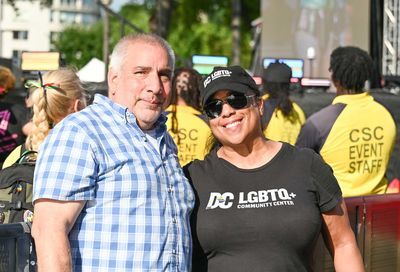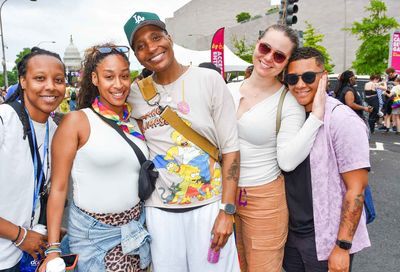Investigation reveals significant levels of hiring discrimination against gay and lesbian Virginians
Civil rights testing by the Equal Rights Center revealed some form of workplace-based discrimination in 30% of tests

An investigation by a D.C-based nonprofit civil rights organization finds that there appears to be a significant level of hiring discrimination against gay and lesbian job applicants in the Old Dominion.
The Equal Rights Center released a new report based on a civil rights testing investigation into bias against LGBTQ Virginians when they seek employment. Using matched pair testing, the ERC compared the experiences between straight job applicants and those who were gay or lesbian, finding some form of anti-LGBTQ discrimination in 30% of the tests.
In the report, titled “Behind Closed Doors,” the ERC concluded that the lack of both federal and state laws providing workplace protections for LGBTQ individuals may be allowing some forms of hiring discrimination to persist, even if the employer is not obvious or blatant about discriminating or expressing hostility towards gay or lesbian applicants.
As part of its testing regimen, the ERC conducted 10 matched-pair tests at companies in Virginia, where a straight applicant and a gay or lesbian applicant with identical or similar demographic information and nearly identical qualifications both applied for the same position.
In two of the tests, the straight-identified tester and the gay-identified tester had objectively different outcomes, with the straight applicant being offered a position when the gay applicant was not. In an even more interesting development, none of the gay testers who were denied the job suspected that they were being discriminated against — a potential testament to the covert and subtle bias that can exist in various workplaces.
Kate Scott, the deputy director of the Equal Rights Center, says the fact that the gay applicants didn’t know they were being discriminated against was a significant finding.
“It demonstrates how hard it is for people to identify discrimination when they might be experiencing it,” she says. “In one of the tests, the applicants stated that the interviewer was very friendly and didn’t ask any inappropriate questions or act negatively when they disclosed their sexual orientation. And still, the formal outcome of the test was one tester got a job offer and the other one didn’t.
“In the other test where that happened, the interaction was very, very short. So it’s not like there was a very long interview or time for either tester to build rapport with the interviewer,” Scott says. “But still, you have that finding in the end that one of the testers got a job offer and the other one didn’t.”
Scott notes that while matched-pair testing is very difficult to arrange — for one thing, you have to find two applicants who are nearly alike in appearance, mannerisms, and age — it is very useful and should be done on a much larger scale if people want to more accurately gauge the degree to which hiring discrimination is occurring.
“One of the strengths of civil rights testing is it gives us experiences we can compare with each other. And unless we compare those experiences, we wouldn’t really know there was discrimination happening,” she says. “So it’s silly to think that any normal person applying for a job would be able to recognize that.”

In a third test, the ERC uncovered possible informal or interpersonal discrimination, where a gay-identified tester reported that he was openly ridiculed by two employees when he disclosed the gender of his spouse.
“One of the reasons we think this report is important is because there is no legal remedy for that behavior if it’s based on someone’s sexual orientation,” explains Scott. “There’s no explicit protection against that, either on the federal level or in Virginia. I am totally on board that [passing such legislation] is not a fix-all, but I do think it would help.
“So if you experience something like that tester did, it really creates a fear of a hostile work environment. And it’s made worse by the fact that you don’t have any legal recourse,” she adds. “So that’s pretty low-hanging fruit, in terms of what to do. Lawmakers in Virginia could change that by passing those types of protections.”
Beyond recommending the passage of nondiscrimination legislation by Congress and the Virginia General Assembly, the ERC report also recommends that businesses adopt their own forms of nondiscrimination policies, both to send a message about the importance of diversity in hiring and to ensure that their employees are not creating a hostile work environment for LGBTQ employees. She also says individual Virginians have an important role to play.
“One of the things we say toward the end of the report is that individuals in Virginia who care about these kinds of issues need to be in direct touch with their representatives, to communicate why this is important to them.”
Support Metro Weekly’s Journalism
These are challenging times for news organizations. And yet it’s crucial we stay active and provide vital resources and information to both our local readers and the world. So won’t you please take a moment and consider supporting Metro Weekly with a membership? For as little as $5 a month, you can help ensure Metro Weekly magazine and MetroWeekly.com remain free, viable resources as we provide the best, most diverse, culturally-resonant LGBTQ coverage in both the D.C. region and around the world. Memberships come with exclusive perks and discounts, your own personal digital delivery of each week’s magazine (and an archive), access to our Member's Lounge when it launches this fall, and exclusive members-only items like Metro Weekly Membership Mugs and Tote Bags! Check out all our membership levels here and please join us today!



























You must be logged in to post a comment.